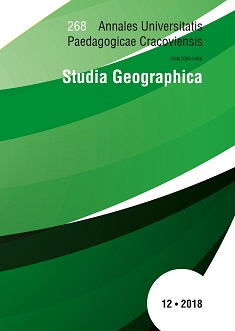Dydaktyka geografii – teoria i metodologia (na przykładzie Bułgarii)
DOI:
https://doi.org/10.24917/20845456.12.10Keywords:
geography, geography didactics, education, training, geography educationAbstract
Understanding, mastering and applying new ideas in geography didactics is the most proper way to achieve a high professionalism in geography education in Bulgaria. Such professionalism implies three prerequisites: a scientifically based (and not only intuitive) professional activity, high and sustainable results and a clear positive attitude towards it. The high professionalism is the required basis for successful solving the current problems of Bulgarian geography education which are of different nature: training and further qualification of working staff, preparation of needed school documentation for thematic subject “Geography and Economy” and the design of research programs and projects in school practice. Undoubtedly, we have to explore the foundations of didactics (its theory and methodology) because it is the starting point for creative problem solving or the implementation of upcoming geography educational tasks. In this context, and against the background of the increasingly higher modern public demands and attitudes towards education, it is necessary to interpret the geography didactics as a science in a new, modern way. In presented paper are examined the essence, subject matter and main issues of geography didactics; scientific tasks and research methods and its place among other sciences. It is also important to outline the
trends of development and scientific potential of geography didactics.
References
Bijkov, G., Kraevski, V. (2007). Methodology and methods of pedagogical research, Sofia: “St. Kliment Ohridski”
Bӧhn, D. (1999). Geographiedidaktik. In: D. Bӧhn (Hg.). Didaktik der Geographie. Begriffe, München: Oldenburg, 50–52
Gaitandjieva, R. (2000). Strategy of Geographical Education in High School in the New Realities, Sofia: Anubis
Gaitandjieva, R., Tzankova, L. (2018). Theoretical-Methodological Basis of Modern Didactics of Geography (Excerpt from Unpublished Works). In: S. Karastoyanov, et al. Regional Development and Policy. Sofia: MELANI, 252–262
Kanchev, D. (2000). Methodology of geography education. 3. edition, Sofia: “St. Kliment Ohridski”
Kӧck, H. (1991). Didaktik der Geographie – Methodologie, München: Oldenburg
Panchehnikova, L. M. (1983). Whole training geography. In: Methodology training geographies in middle school. Moscow
Rinschede, G. (2007). Geographiedidaktik. 3. Auflage, Paderborn u.a.: Ferdinand Schӧningh
Tzankova, L. (2005). Geography Didactics Guide, Sofia: “St. Kliment Ohridski”
Tzankova, L., et. al (2015). Geography Didactics – Between Theory and Practice. In: Achievements, up-to-date and challenges of geographical science and perceptions. University of Beograd – Faculty of Geography, Beograd, october 2015, 168
Vasileva, M. (2018). Current Issues of Modern Didactics of Geography. Guide to seminars. Sofia: MELANI
Downloads
Published
Issue
Section
License
The submission of a paper to be published is synonymous with an agreement to transfer the copyright free of charge from the author to the publisher. The author also agrees to permit the publisher to publish the paper in printed form, open access online form, digital library form and other digital platforms with which the publisher has or will have a publishing agreement. Furthermore, the author agrees to not limit the number of copies that may be printed or issued by the publisher. In the case of co-authored papers, it is assumed that the corresponding author is authorized to represent the remaining co-authors in this respect. Authors are requested to sign a copyright declaration.

